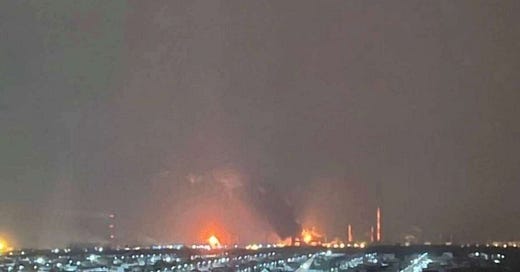First the free ebooks, then the news Russia Burns, including videos & an Essay explaining Why Ukraine will fight on to final victory!
How to Learn the Chinese "Alphabet"!
Mastering Constitutional Law for the Multistate Bar Exam Multiple Choice Section
Business Associations, Agency, Partnership, Corporations Law Quiz Questions for Final Exams and Bar Review
THE ART OF WAR AND PEACE
Watergate 2.0
if you like it
Boat Bingo! The Tuapse Edition!
Ukraine hits Crimea (Bridge targeted, shipping too) https://glavred-info.translate.goog/war/krupneyshaya-za-poslednee-vremya-ataka-na-krym-v-rayone-aerodromov-i-mosta-vzryvy-10642715.html
Ukrainian drones also hit Tuapse, Krasnodar (Anape) Ryazan, Sevastopol. Oil Burns.
I guess Don Trump’s peace plan is fucked, huh!
Surrender Is Not an Option
The ongoing war in Ukraine is not merely a territorial dispute or a conflict over NATO expansion, but a fight for national survival against an aggressor determined to eradicate Ukrainian statehood. While some, like Stephen Kotkin, argue for a negotiated settlement, the reality on the ground and historical precedent demonstrate that such an approach is both dangerous and ultimately futile.
The True Nature of Putin's Ambitions
Trump and Kotkin alike imagine, mistakenly, that a “truce” or “peace” be possible in Ukraine. They are mistaken and the consequences of their errors would be unfortunate unless timely corrected.
Putin's actions and rhetoric have consistently shown that his goal extends far beyond preventing NATO expansion or securing specific territories. His view of Ukraine, the Baltics, Finland, and Poland as part of Russia's "sphere of influence" fundamentally denies Ukraine's right to exist as a sovereign nation and threatens a half dozen other NATO Member States. The war is rooted in Putin's belief that Ukraine should not be an independent state, making any territorial concessions or security guarantees insufficient to address the underlying cause of the war. It continues Putin’s pattern of savage war after war in Chechnya, Dagestan, Syria, Georgia, he is clearly trying to “level up” and become an even greater threat.
The Futility of Negotiations
History has shown that Putin cannot be trusted to honor agreements:
Russia has repeatedly violated international treaties and ceasefire agreements over the past two decades.
The Minsk accords of 2014-2015, intended to stabilize the conflict in Donbas, were ultimately used by Russia as a pretext for further aggression.
Even when negotiations in early 2022 approached an agreement on NATO aspirations and territorial concessions, Russia abandoned talks and expanded its war aims.
Any negotiated settlement would be merely a temporary measure, allowing Russia to regroup and resume its war when conditions are more favorable to it.
The Stakes for Ukraine is in a War for National Survival and CANNOT Surrender
The consequences of capitulation for Ukraine would be catastrophic:
Existential Threat: Putin's vision leaves no room for a truly independent Ukraine.
Humanitarian Crisis: The invasion has already caused immense suffering, with hundreds of thousands killed and millions displaced6.
Long-term Trauma: The war has plunged the entire Ukrainian population into a mental health crisis that will last for decades6.
Surrendering now would not only fail to address these issues but would likely exacerbate them, leaving Ukraine vulnerable to future aggression and unable to protect its citizens.
The Illusion of Peace
Kotkin's proposal for a "political front" and a "Russian government in exile" fails to account for the deep-rooted nature of Putin's regime and the widespread support for the war among Russians1. Recent polls show that a significant majority of Russians support the military's actions in Ukraine and reject the idea of returning occupied territories1.
The Path Forward
While the war has been grueling and the costs high, Ukraine's resilience has been remarkable. President Zelenskyy has effectively mobilized both his nation and international support2. This unity and determination are crucial for Ukraine's survival and eventual victory.
The international community must recognize that pressuring Ukraine to settle with Russia would only provide a temporary and superficial solution3. Instead, continued support for Ukraine's defense and sovereignty is essential. As Zelenskyy has stated, it would be "very difficult" for Ukraine to survive without U.S. military support9.
In conclusion, while the desire for peace is understandable, the realities of Putin's Russia make a negotiated settlement both unrealistic and dangerous for Ukraine's future. The war in Ukraine will likely continue until Russia's capacity or will to wage war is significantly diminished, or until Ukraine receives sufficient support to decisively repel the invasion. Only then can a genuine and lasting peace be achieved.
Citations:
https://www.russiamatters.org/analysis/stephen-kotkin-ukraine-russia-china-and-world
https://www.journalofdemocracy.org/articles/why-ukraine-shouldnt-negotiate-with-putin/
https://www.hoover.org/research/issues-negotiations-looking-toward-end-war-ukraine
https://www.newyorker.com/news/the-new-yorker-interview/how-the-war-in-ukraine-ends










